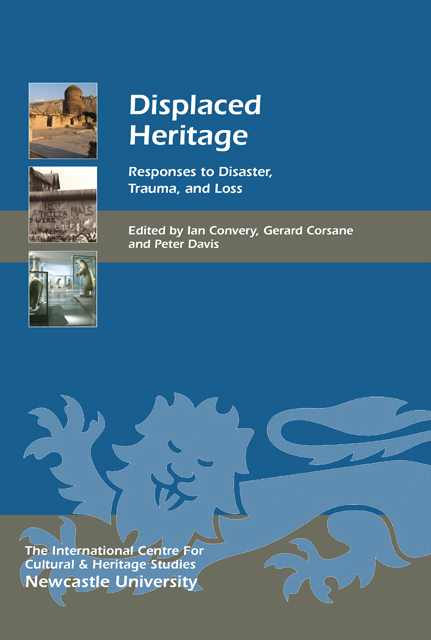Book contents
- Frontmatter
- Contents
- List of Illustrations
- Acknowledgments
- List of Abbreviations
- Preface
- Introduction
- Displaced Heritage: Histories and Tourism
- Displaced Heritage: Trauma, Confinement and Loss
- Displaced Heritage: Lived Realities, Local Experiences
- Displaced Natural Heritage
- Endpiece
- List of Contributors
- Index
- Heritage Matters
28 - What Heritage? Whose Heritage? Debates Around Culling Badgers in the UK
Published online by Cambridge University Press: 24 February 2023
- Frontmatter
- Contents
- List of Illustrations
- Acknowledgments
- List of Abbreviations
- Preface
- Introduction
- Displaced Heritage: Histories and Tourism
- Displaced Heritage: Trauma, Confinement and Loss
- Displaced Heritage: Lived Realities, Local Experiences
- Displaced Natural Heritage
- Endpiece
- List of Contributors
- Index
- Heritage Matters
Summary
Introduction
This chapter concerns some of the debates centred on the recent proposals by both the English and Welsh governments to cull badgers in an attempt to lessen the incidence and prevalence of bovine TB (bTB) in cattle. It discusses some of the local meanings of ‘heritage’ and ‘nature’, and shows that both are highly contested terms in which different categories of people seek to appropriate ownership of them. It draws most particularly on fieldwork conducted in west Wales (one of the ‘hot-spots’ for bTB) with farmers, anti-cull activists and others, both Welsh- and English-speaking, and also makes use of local and national media, scientific reports and children’s literature in order to seek to understand the varying positions taken on the proposed culls.
In two earlier articles, which focused on the proposed badger cull in west Wales between 2009 and 2012, I sought to discuss the complexities of the situation. The first paper (Caplan 2010) considered some local reactions to news of the cull, ranging from those who supported it wholeheartedly to those who argued against it, as well as a number who were somewhere in between. It also discussed some of the reasons why people adopted such differing standpoints, showing that a range of issues helped explain why people thought as they did. These included perceptions of risk, ethnicity, ideas about animals and wildlife, the selective uses of both scientific literature and emotional arguments, and finally some of the local and regional politics involved.
The second paper (Caplan 2012) continued the story of the proposed cull in Wales from mid-2010, when there were confrontations and arrests, to the effects of the changed political environment after the 2011 Welsh elections, when the policy was switched from one of culling badgers to vaccinating them. The paper argued that epidemics like bTB are a way of talking about a wide range of issues, including the state (at varying levels) and its policymaking, human–animal relations, and farming and conservation.
In this chapter, I consider some of the ways in which a disaster like bTB is dealt with at the level of individuals, communities and governments, as well as how the idea of ‘our heritage’, in the sense of landscape and the survival of both farmed and wild animals, is appropriated and contested, and how each side in the badger cull debate considers itself and ‘its’ animals to be the ones suff ering in both social and individual terms.
- Type
- Chapter
- Information
- Displaced HeritageResponses to Disaster, Trauma, and Loss, pp. 303 - 310Publisher: Boydell & BrewerPrint publication year: 2014



